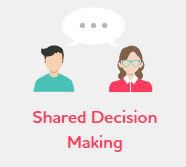Blog 1 - What is Realistic Medicine?


November 2024
Welcome to our Grampian Realistic Medicine blog.
Our first blog explains what Realistic Medicine is including an example of work to help continually improve how we deliver health and care.
Introduction: What is Realistic Medicine?
Realistic Medicine is transforming health care delivery by promoting patient-centred care. This approach recognises that every patient is unique, with individual values and preferences. Rather than asking, "What’s the matter with you?" it shifts the focus to "What matters to you?" This ensures treatment meets each patient's needs.
At the heart of realistic medicine is shared decision-making.
Understanding shared decision-making

Shared decision-making in health care is where health care professionals and patients work together to make decisions about the patient’s care. Professionals provide expertise on treatment options, while patients share their values and preferences. This can lead to decisions that are tailored to the person.
Did you know?
Based on a November 2024 report from Health Improvement Scotland, 97% of those surveyed from the Scottish Citizen’s Panel said they want to be involved in shared decision making to help choose treatment and care that is right for them. Find the full report here: fourteenth-citizens-panel-report-nov24.pdf
Putting it into practice
In September, NHS Grampian and the University of Aberdeen began a pilot training session based on shared-decision making. Participants engaged in realistic clinical scenarios in a simulation room that looked like a clinical setting. Patient partners—volunteers with experience as hospital patients— made the sessions more realistic by acting as patients facing difficult decisions.
Staged or "simulated" conversations focused on treatment escalation plannin. This means making decisions about what treatment options are right for a patient if they become more unwell when in hospital.
Healthcare professionals could either participate in these simulated conversations or watch their colleagues. They could practice difficult conversations in a safe yet realistic space and receive real-time feedback.
Evaluation and feedback
7 participants attended the sessions, including doctors, nurses and allied health professionals. The 6 participants who completed the evaluation said they were extremely likely to recommend the training to colleagues. There was also a clear increase in understanding of shared decision making and a boost in their confidence to make these conversations in real situations.
The positive responses show how this training positively impacts health professionals' skills to effectively practice realistic medicine. This means that shared decision-making is part of patient care.
Thinking about shared decision making in relation to your own care or someone you know?
If you are thinking about shared decision making in relation to your own care, or that of your family you can find out more by clicking the link here: Shared decision making | The Patients Association
If you have any feedback on this blog, please contact: gram.realisticmedicine@nhs.scot
Are you a health care professional who wants to learn more or share the work you’re doing?
For health care professionals who want to learn more about shared decision-making, an updated module has been launched and can be found Shared Decision Making elearning module | Turas | Learn (you need to be logged into Turas for this to work).
We’d love to hear from you
We want to promote your examples of good practice or work that you’re doing that aligns with the pillars of Realistic Medicine. This blog is hosted on our website and shared via social media, the daily brief and other avenues.
If you would like to contribute to this blog, please fill in the form via this link: https://forms.office.com/e/94w59ubDsM or contact: gram.realisticmedicine@nhs.scot
Find us on social media:
- Facebook: facebook.com/NHSGRealisticMedicine
- X (formerly known as Twitter): x.com/MedicineNhs
- Instagram: instagram.com/nhsg_realistic_medicine
